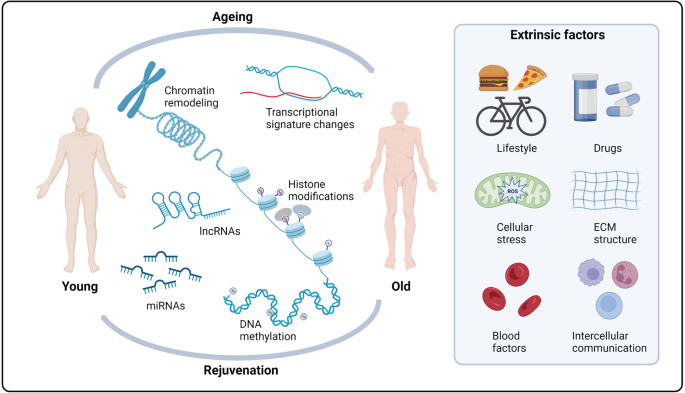Did you know that your body has the incredible ability to heal and regenerate itself at the cellular level? This remarkable process, known as cellular rejuvenation, is a fascinating area of scientific research that explores ways to enhance our body’s natural healing mechanisms. By understanding the science behind cellular rejuvenation, we can uncover the secrets to maintaining health and vitality for years to come. In this article, we will explore the incredible power of our body’s cells and the groundbreaking research that is shedding light on the mysteries of cellular rejuvenation. So, get ready to discover the remarkable world of cellular rejuvenation and unlock the potential for a healthier, more vibrant you.
Understanding Cellular Rejuvenation
Definition and Explanation of Cellular Rejuvenation
Cellular rejuvenation refers to the process by which cells in the body are revitalized and restored to a more youthful state. It involves reversing the effects of cellular aging and promoting optimal cellular function. This rejuvenation process is crucial for maintaining overall health and well-being.
Importance of Cellular Rejuvenation
Cellular rejuvenation plays a vital role in the overall functioning and longevity of our bodies. As we age, our cells undergo biological changes that can result in decreased energy production, impaired cellular repair, and increased cellular damage. By promoting cellular rejuvenation, we can enhance our body’s ability to repair and regenerate cells, which can have profound effects on our health, appearance, and quality of life.
Factors Influencing Cellular Rejuvenation
Genetic Factors
Genetics play a significant role in determining how our cells age and how they respond to rejuvenation efforts. Some individuals may be genetically predisposed to age at a slower rate, while others may experience accelerated aging due to inherited factors. However, regardless of our genetic makeup, it is important to note that lifestyle and environmental factors can influence cellular rejuvenation to a great extent.
Environmental Factors
The environment we live in can have a significant impact on the rejuvenation of our cells. Exposure to harmful pollutants, toxins, and radiation can accelerate cellular aging and hinder the rejuvenation process. On the other hand, creating a clean and healthy environment can support optimal cellular function and enhance the effectiveness of rejuvenation efforts.
Lifestyle Factors
Our lifestyle choices also play a crucial role in cellular rejuvenation. Factors such as nutrition, exercise, sleep, and stress management can greatly influence the health and efficacy of our cells. By adopting healthy habits and making conscious choices that promote cellular rejuvenation, we can optimize our body’s ability to regenerate and repair cells.
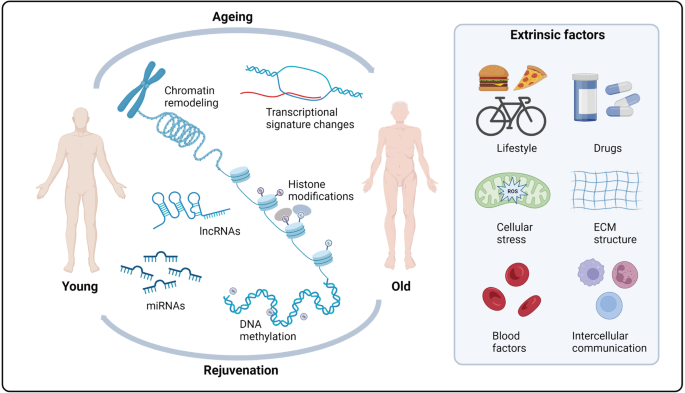
This image is property of media.springernature.com.
Cellular Aging and Rejuvenation Process
Signs of Cellular Aging
Cellular aging is characterized by various signs and symptoms. These can include wrinkles, sagging skin, loss of muscle tone, reduced energy levels, decreased cognitive function, and slower wound healing. Additionally, cellular aging can lead to the development of age-related diseases such as cardiovascular disease, neurodegenerative disorders, and weakened immune function.
Cellular Rejuvenation Mechanisms
Cellular rejuvenation occurs through various mechanisms that help repair and regenerate cells. These mechanisms include DNA repair, cellular proliferation, apoptosis (cell death), removal of damaged proteins, and the activation of cellular pathways that promote rejuvenation. These processes work together to restore the functionality and vitality of our cells.
Cellular Senescence
Cellular senescence refers to the state of irreversible cell cycle arrest that occurs in response to cellular damage or stress. While senescence is a normal part of the aging process, excessive accumulation of senescent cells can contribute to age-related diseases. Cellular rejuvenation aims to clear or reverse the effects of cellular senescence to promote healthier and more youthful cells.
Role of Telomeres in Cellular Rejuvenation
Telomeres and Aging
Telomeres are protective caps located at the ends of our chromosomes, and they play a crucial role in cellular rejuvenation. As cells divide, telomeres gradually shorten, eventually leading to cellular aging and dysfunction. Maintaining the length and integrity of telomeres is vital for promoting cellular rejuvenation and delaying the aging process.
Telomerase Enzyme
Telomerase is an enzyme that helps prevent telomere shortening by adding repetitive DNA sequences to the telomeres. It is particularly active in stem cells and certain types of cells with high regenerative capacity. The activation of telomerase can help maintain telomere length and promote cellular rejuvenation.
Telomere Shortening and Lengthening
Telomere shortening occurs naturally with each cell division, but various factors can accelerate this process. Chronic stress, poor lifestyle choices, and exposure to environmental toxins can all contribute to rapid telomere shortening. However, certain lifestyle interventions, such as exercise, stress reduction, and a healthy diet, can support telomere lengthening and promote cellular rejuvenation.
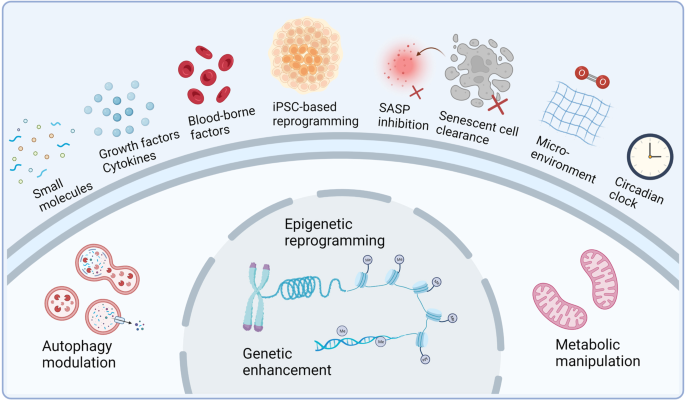
This image is property of media.springernature.com.
The Role of Mitochondria in Cellular Rejuvenation
Mitochondrial Dysfunction and Aging
Mitochondria are the powerhouses of our cells, responsible for generating energy in the form of adenosine triphosphate (ATP). However, as we age, mitochondrial function can decline, resulting in reduced energy production and increased cellular damage. Restoring mitochondrial function through various interventions is crucial for promoting cellular rejuvenation.
Mitochondrial Biogenesis
Mitochondrial biogenesis refers to the process of creating new mitochondria within cells. This process helps enhance cellular energy production and can improve overall cellular health. Regular exercise, calorie restriction, and certain nutrients can stimulate mitochondrial biogenesis and support cellular rejuvenation.
Mitophagy and Autophagy
Mitophagy and autophagy are cellular processes involved in the removal of damaged or dysfunctional mitochondria and cellular components. By eliminating these damaged components, cells can maintain functionality and promote rejuvenation. Interventions that support these processes, such as intermittent fasting and certain supplements, can aid in cellular rejuvenation.
The Impact of Oxidative Stress on Cellular Rejuvenation
Definition of Oxidative Stress
Oxidative stress occurs when there is an imbalance between the production of reactive oxygen species (ROS) and the body’s antioxidant defenses. ROS are highly reactive molecules that can damage cellular components, including DNA, proteins, and lipids. Chronic oxidative stress can accelerate cellular aging and hinder rejuvenation efforts.
Effects of Oxidative Stress on Cells
Oxidative stress can have detrimental effects on cellular rejuvenation. It can lead to DNA damage, impaired protein function, and cellular inflammation. These effects can result in cellular dysfunction and hinder the regeneration and repair processes necessary for rejuvenation. Therefore, reducing oxidative stress is essential for supporting cellular health and promoting rejuvenation.
Antioxidants and Cellular Rejuvenation
Antioxidants play a crucial role in cellular rejuvenation by neutralizing ROS and protecting cells from oxidative damage. Consuming a diet rich in antioxidant-rich fruits and vegetables, as well as supplementing with certain antioxidants, can help reduce oxidative stress and support cellular rejuvenation. Additionally, lifestyle factors such as reducing exposure to environmental toxins and managing stress can further enhance the effectiveness of antioxidants in cellular rejuvenation.
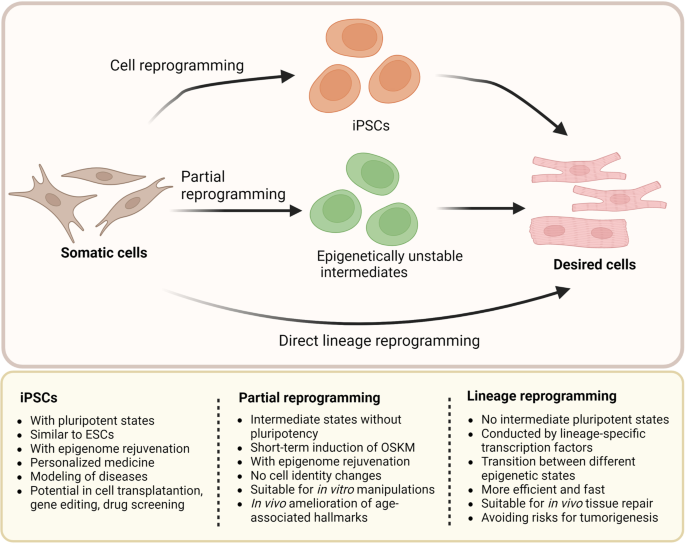
This image is property of media.springernature.com.
Nutrition and Cellular Rejuvenation
Nutrients Essential for Cellular Rejuvenation
Certain nutrients are essential for supporting cellular rejuvenation. These include vitamins, minerals, fatty acids, and phytochemicals. Nutrients such as vitamin C, vitamin E, zinc, selenium, omega-3 fatty acids, and polyphenols have been shown to have antioxidant and anti-inflammatory properties that can benefit cellular health and promote rejuvenation.
Dietary Strategies for Enhancing Cellular Rejuvenation
Adopting a diet rich in whole foods, especially fruits, vegetables, lean proteins, and healthy fats, is essential for enhancing cellular rejuvenation. Avoiding processed foods, excessive sugar intake, and unhealthy fats can help reduce inflammation and oxidative stress, thereby supporting cellular health. Additionally, intermittent fasting and calorie restriction have been shown to have rejuvenating effects on cells by activating cellular repair mechanisms and stimulating mitochondrial biogenesis.
Exercise and Cellular Rejuvenation
Physical Activity and Cellular Health
Regular exercise is essential for promoting cellular rejuvenation. Physical activity increases blood flow, oxygenation, and nutrient supply to cells, which helps support cellular function and repair. Exercise also stimulates the release of growth factors and hormones that promote cell renewal and regeneration. Additionally, exercise improves mitochondrial function, enhances cellular detoxification, and reduces oxidative stress, all of which contribute to cellular rejuvenation.
Effects of Exercise on Cellular Rejuvenation
Exercise has been shown to have numerous beneficial effects on cellular rejuvenation. It increases telomerase activity, which helps maintain telomere length and delays cellular aging. Exercise also improves mitochondrial function, stimulates autophagy and mitophagy, and enhances the production of antioxidant enzymes. These physiological changes contribute to enhanced cellular rejuvenation and overall well-being.
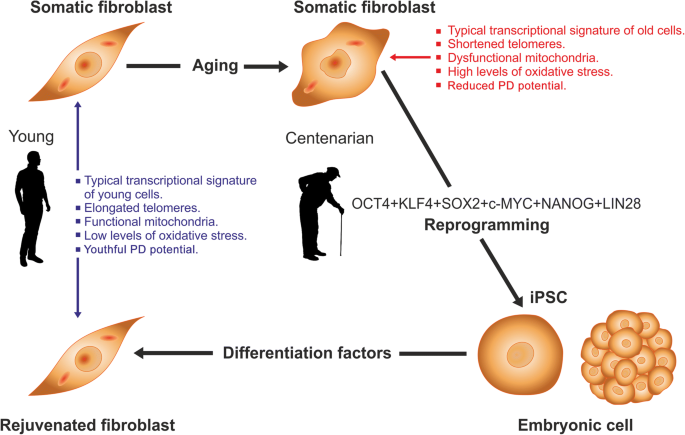
This image is property of media.springernature.com.
Sleep and Cellular Rejuvenation
Role of Sleep in Cellular Rejuvenation
Adequate and restful sleep is crucial for cellular rejuvenation. During sleep, the body undergoes various repair and restoration processes. Cells repair DNA damage, eliminate waste products, and synthesize proteins necessary for rejuvenation. Quality sleep also helps regulate hormone levels, including those involved in the growth and repair of cells. Therefore, prioritizing quality sleep is essential for supporting cellular health and rejuvenation.
Sleep Deprivation and Cellular Aging
Chronic sleep deprivation can accelerate cellular aging and hinder rejuvenation efforts. Lack of sleep disrupts the body’s natural repair processes, impairs immune function, and increases oxidative stress. It can also lead to metabolic imbalances and hormone dysregulation, which can further contribute to cellular dysfunction. To optimize cellular rejuvenation, it is crucial to establish healthy sleep habits and prioritize sufficient and restful sleep.
Tips for Improving Sleep Quality
To improve sleep quality, it is essential to establish a consistent sleep schedule, create a relaxing sleep environment, and practice good sleep hygiene. This includes avoiding stimulating activities before bed, limiting exposure to electronic devices, maintaining a cool and dark sleep environment, and practicing relaxation techniques such as meditation or deep breathing. Additionally, avoiding caffeine and alcohol consumption close to bedtime can help promote better sleep quality.
Stress and Cellular Rejuvenation
Effects of Chronic Stress on Cellular Aging
Chronic stress can have a detrimental effect on cellular rejuvenation. Prolonged exposure to stress hormones, such as cortisol, can result in cellular damage, inflammation, and accelerated aging. Chronic stress can also impair the immune system, disrupt sleep, and affect other lifestyle factors that are crucial for cellular rejuvenation. Managing and reducing stress is essential for promoting optimal cellular health and rejuvenation.
Stress Management Techniques for Cellular Rejuvenation
Implementing stress management techniques can significantly contribute to cellular rejuvenation. Practices such as mindfulness meditation, yoga, deep breathing exercises, and regular relaxation can help lower cortisol levels, reduce inflammation, and enhance cellular repair and regeneration. Additionally, engaging in activities that bring joy and promote emotional well-being can have a positive impact on cellular health and rejuvenation.
In conclusion, cellular rejuvenation is a complex process influenced by various factors. Genetic, environmental, and lifestyle factors all play crucial roles in determining how our cells age and how effectively they can be rejuvenated. Understanding these factors and employing strategies that support cellular health, such as proper nutrition, regular exercise, sufficient sleep, stress management, and reducing oxidative stress, can enable us to optimize our body’s ability to rejuvenate and promote overall well-being and longevity.
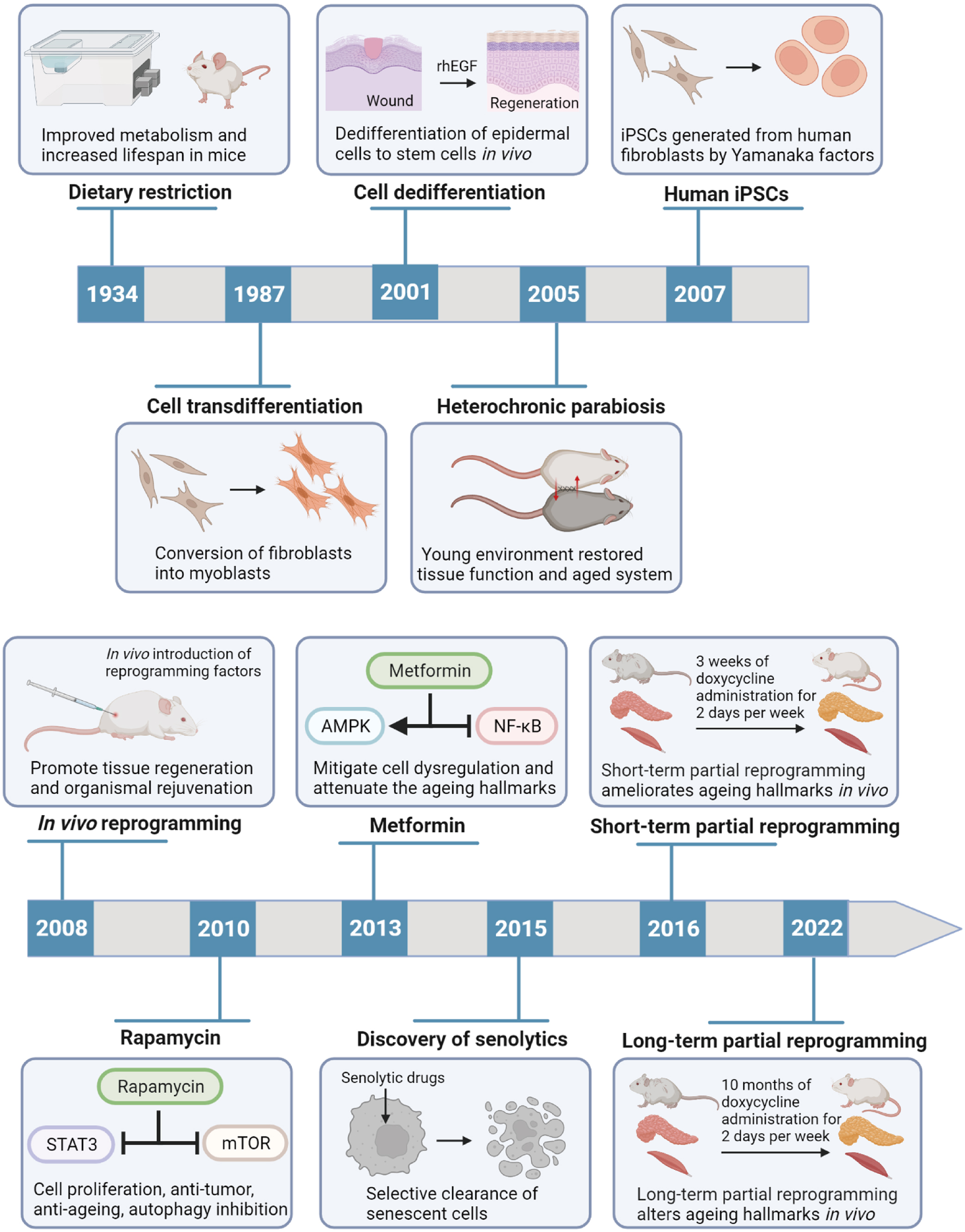
This image is property of media.springernature.com.

